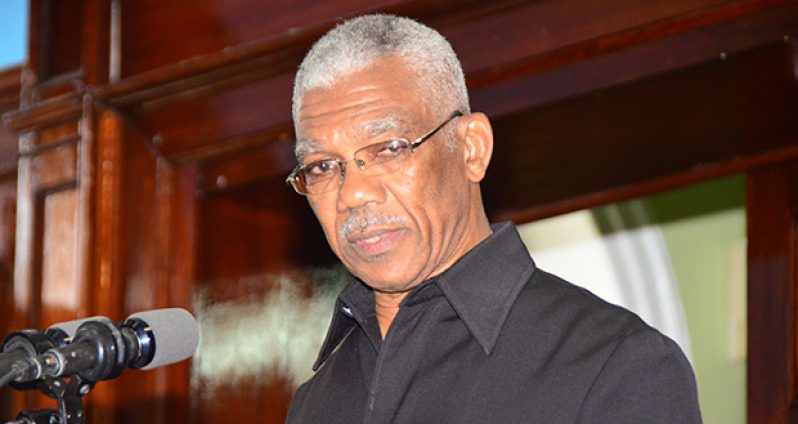PRESIDENT David Granger has contended that the secondary school education system here is a rebuke to the belief in equality, inclusivity and meritocracy as he lamented that education at that level is not universal.The Administration has inherited the flaws when it came to power about five months ago. The education system was under reform but began to rapidly deteriorate about three and a half years ago. According to statistics from the Ministry of Education, in 2009, students’ pass rate counting grades 1 to 3 was 63.7 per cent; in 2010 it increased to 66.2 per cent; and in 2011, it declined slightly to 64 per cent. In 2012 it slipped to 58. 6 per cent; in 2013, it inched to 59.3 per cent; while in 2014 it increased minimally to 60.2 per cent. In the last three years, the achievement can be best described as horizontal progress, as it was below the lowest national pass rate obtained in the previous three years. In many instances, the failures have led to frustration.
“Every day, five children drop out of secondary schools. What is to become of them? Each year more than half of the students who undertake the National Grade Six Assessment fail. This means that our secondary education system is not producing the desired results. It means that half of the students who enter the secondary school system may not be qualified to be there. This performance impacts on the quality of the results at the secondary level,” the President pointed out.
Every year, the previous government had channelled billions of dollars into the education sector. Undoubtedly, the results did not reflect value for money, given that there was an increase in spending on education in the past three years. Because of this neglect, in 2015, fewer than half of those who wrote English A and Mathematics at the Caribbean Secondary Education Certificate (CSEC) examinations secured passes. The Ministry of Education had described as ‘unsatisfactory’ the performance of students in the core science subjects of Physics and Chemistry. “This performance is unacceptable in the knowledge-based world in which we live. Guyana simply cannot continue along this trajectory if it is to compete with our sisters in the Caribbean,” Mr Granger said. And aside from this problem, he noted the troubling disparities in education attainment between the coastland and the hinterland and between the schools in Georgetown and the rest of the coastland.
The major secondary schools – Queen’s College, Bishops; St Stanislaus; St Rose’s; St Joseph’s — are all located in Georgetown. According to President Granger, a form of educational apartheid is developing. “We must avoid and avert the danger of children being separated along lines of gender, social class or geographical location. There is need to reshape our educational policies if we are to arrest the decline in the educational system, to reduce the disparities in performance and to better prepare graduates of our secondary school system for the world of work,” he said.
The President, who was at the time speaking at the recent schools’ national award ceremony at the National Cultural Centre (NCC), said the education system must continue to reward excellence but they must also reduce or remove inequalities.
“If we do not reward meritocracy, standards will fall. We must encourage our students – as we are doing here today – to strive for excellence. The success of a few should, however, not be the sole defining feature of our secondary school system. We cannot judge the quality of our educational system by the performance of the top one per cent of the population. We must assess the quality of our educational system by how all students perform. There are 70,000 secondary school students in Guyana. How many of them will be attending ceremonies like this in years to come?” he asked.
Secondary education a rebuke to equality -Granger says a form of educational apartheid developing
SHARE THIS ARTICLE :
Facebook
Twitter
WhatsApp




.png)









